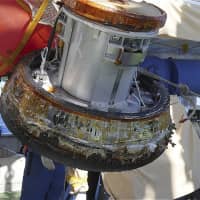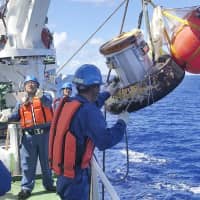A capsule ejected from a space cargo vessel returned to Earth on Sunday, bringing back experiment samples from the International Space Station (ISS) in the first such mission for Japan.
The Japanese Aerospace Exploration Agency (JAXA) said the capsule, measuring 84 centimeters wide and 66 cm high, made a parachute-assisted splashdown in the Pacific near the island of Minamitorishima early in the morning and was retrieved later in the day.
"I think we've succeeded almost as planned," said Hirohiko Uematsu, technology director at JAXA, during a news conference at the agency's Tsukuba Space Center in Ibaraki Prefecture. "Japan has obtained the technology that is essential for us to move forward."
JAXA is now aiming to develop a new capsule that can return home without being assisted by a space vessel, while the success of the latest mission is also expected to help in the development of Japan's own spacecraft for manned missions in the future.
The retrieved capsule contained protein crystals, grown in experiments conducted aboard the ISS, that JAXA says will be analyzed for medical purposes.
High-quality protein crystals grown without the influence of gravity will be helpful in exploring the causes of some diseases and developing medicines to cure them, according to the agency.
The samples will be transported on Tuesday to JAXA's Tsukuba space center in Ibaraki Prefecture, where scientists will study them in the coming weeks.
The Japanese cargo vessel Kounotori 7 was launched in September on an H-IIB rocket, delivering the capsule and other supplies to the ISS.
The vessel departed from the space station Thursday and released the capsule Sunday morning, before burning up with waste from the ISS when re-entering Earth's atmosphere, JAXA said.




